语法第5集:名师讲解+中考真题欣赏+配套练习题及答案(共48页)
最新中考英语(通用版语法专项讲解及配套练习汇总(批量下载)
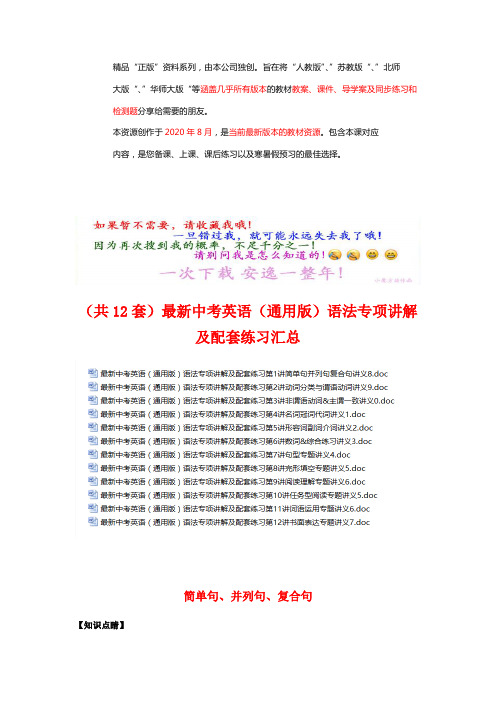
精品“正版”资料系列,由本公司独创。
旨在将“人教版”、”苏教版“、”北师大版“、”华师大版“等涵盖几乎所有版本的教材教案、课件、导学案及同步练习和检测题分享给需要的朋友。
本资源创作于2020年8月,是当前最新版本的教材资源。
包含本课对应内容,是您备课、上课、课后练习以及寒暑假预习的最佳选择。
(共12套)最新中考英语(通用版)语法专项讲解及配套练习汇总简单句、并列句、复合句【知识点睛】一、句子分类____________(____________________________)____________________________________________(_____________________)⎧⎧⎪⎪⎪⎪⎨⎪⎪⎪⎪⎩⎨⎪⎧⎪⎪⎪⎨⎪⎪⎩⎩ 、、、 按分 句子按分 、、 二、陈述句、疑问句、祈使句、感叹句 陈述句:用于说明事实或说话人的看法 疑问句:用于提问祈使句:用于表示请求、命令、劝告、建议等 感叹句:用于表达强烈的感情(一)陈述句有肯定和否定两种形式,多以句号结尾,读降调. 陈述句的否定式:1. be 的否定式(be 作系动词和助动词)2. 助动词、情态动词的否定式3. 除not 外,其他否定词也可以构成否定句1) 用no 表示,no = not any/a2) never 从不,决不,永不 seldom 很少 hardly 几乎不 3) little, few 几乎没有 4) no one/nobody 没有人 5) nothing 什么也没有6) neither of…没有什么(两者都不);none of…没有任何,什么都没有(三者或三者以上都不) 7) too…to…太……以至于不能……(二)疑问句1. 一般疑问句(1)用什么词提问,用什么词回答.—Are you a student? 你是一个学生吗?—Yes, I am. 是的,我是. /—No, I’m not. 不,我不是.(2)否定的一般疑问句往往表示惊讶、赞叹、怀疑等语气. (注意yes/no的翻译)—Don’t you watch TV at night? 你晚上不看电视吗?—Yes, I do. 不,我看电视. /—No, I don’t. 是的,我不看电视.(3)用其他词语代替yes/no,使语气更客气、委婉.—Can you go to the movies with me? 你能和我一起去看电影吗?—I’m afraid not. I have much homework to do. 恐怕不行,我有很多作业要做.2. 特殊疑问句用特殊疑问词来引导,不用________回答. 特殊疑问词包括疑问代词、疑问副词和疑问词组. (1)疑问代词:what, who, which, whose, whom(2)疑问副词:when, where, why, how(对状语进行提问)(3)疑问词组:how soon, how long, how far, how often等(4)否定的特殊疑问句一般有劝告、建议、责备等意味.Why don’t y ou come here?= Why not come here?3. 选择疑问句提出两种或以上的情况要对方选择,不能用________回答,要用完整的句子或其省略形式. (1)一般选择疑问句句式—Do you like tea or coffee?—I like tea.(2)特殊选择疑问句句式—Which do you like better, tea or coffee?—I prefer tea.4. 反意疑问句(1)结构:“陈述部分,简短问句?”(2)原则:_______________,______________(3)三步走:第1步将陈述部分变成一般疑问句第2步提取“助动词(或be动词)+主语”,当主语为名词时,要变为代词第3步前肯后否,前否后肯(能缩就缩)(4)回答:实事求是【翻译】——Lucy从不早起,是吗?——是的,她从不早起. /不,她有时候早起.__________________________________________________________________________________________________________________________(三)祈使句特征:以____________开头,省略第二人称主语_______;若要表示礼貌,可以加上语气词___________.肯定式否定式特殊式Stand up! Don’t stand up! No smoking/parking!Be quiet! Don’t be noisy! No photos!Let him in! Don’t let him in!(四)感叹句感叹句是用来表达人的特殊感情的句子,可以表达人的喜、怒、哀、乐等感情色彩. 感叹句可以是一个单词、一个不定式、一个由短语构成的独立句,也可以是由what或how引导的句子,句末常用“!”.Great!A good job!_______________________________What a good day (it is)!What terrible weather (it is)!What smart students (they are)!_______________________________How terrible (the weather is)!How smart (the students are)!How fast he runs!【填空】___________ tall the boy is!___________ lovely children!___________ useful book it is!___________ exciting news!三、简单句、并列句、复合句简单句:由一个主语(或并列主语)和一个谓语(或并列谓语)构成的句子.I am a student.Lily and Lucy are twins.He went up to the door, opened it and entered.She will go there either this week or next week.并列句:由并列连词(and, so, but, or等)把两个或以上的简单句连在一起构成的句子. He did the work and he did it well.I like music, but I don’t like this song.Either you leave, or Tom leaves.复合句:由一个主句和一个或一个以上的从句构成的句子.Do you know where my bike is?John fell asleep while he was listening to the music.That is the woman I met yesterday.(一)常见句子成分主语:句子所要说的人或物;通常由名词或代词担任谓语:说明主语的动作或状态;由主动词充当宾语:及物动词或介词的对象或结果;通常由名词或代词担任表语:在系动词后,表明主语身份或特征;通常由名词、代词、形容词充当定语:修饰名词或代词;通常由形容词、代词、数词担任状语:修饰动词、形容词、副词;通常由副词、介词短语担任宾语补足语:说明宾语怎么样或干什么;常由形容词、动词担任同位语:通常紧跟在名词、代词后,进一步说明它的情况(二)简单句五大基本句型主系表 / 主谓(vi.) / 主谓(vt.)宾 / 主谓(vt.)宾宾 / 主谓(vt.)宾宾补(三)连词___________________________________________________________________________________________________________⎧⇒⎧⎪⎪⎧⎪⎪⎪⎪⎪⎨⎪⎪⇒⎨⎪⎪⎪⎪⎨⎪⎪⎩⎩⎪⎪⎧⎪⎪⎪⇒⎨⎪⎪⎩⎩连接词与词或短语与短语表表连接简单句与简单句表连词表连接主句与从句 四、三大从句 (一)宾语从句含义:在主从复合句中充当宾语的句子. We know Jack is a lazy student.We are talking about whether it’s a cat . He is unhappy that he didn ’t pass the exam.分类:动词后宾语从句、介词后宾语从句、形容词后宾语从句 三要素:________、________、________连接词_______ (可省略) _______________ _______________ 宾语从句:陈述句 宾语从句:一般疑问句 宾语从句:特殊疑问句语序 _________语序 时态Miss Li said that the earth ________ (be) round.【难点1】只用连接词whether的情况I’m thinking about __________ I should see the film.I haven’t decided __________ to go to the cinema.I’m not sure __________ or not it’s worth seeing the film.结论:________________________________________【难点2】特殊疑问句本身语序为陈述语序的句子Who broke the window?What happened last night?What’s the matter/the trouble?What’s up/wrong?When will we meet?【难点3】宾语从句和简单句的转换I don’t know what I can/should do next. = I don’t know what to do next.He couldn’t decide which one he could/should buy. = He couldn’t decide which one to buy. Could you tell me how I can get to the zoo? = Could you tell me _________________________? 结论:1. 当主句的________与从句的________一致时,且主句的谓语动词是know, decide, learn等时,此复合句可转换成简单句,即从句部分改为“特殊疑问词+不定式”结构.2. 当主句谓语是ask, tell, show, teach等________动词时,且主句的______________和从句的________一致时,此复合句可转换成简单句,即从句部分改为“特殊疑问词+不定式”结构.(二)状语从句含义:在主从复合句中充当状语的句子.The bus had left when we arrived at the station.分类:时间状语从句,条件状语从句,让步状语从句,原因状语从句,结果状语从句目的状语从句,比较状语从句各类状语从句连词:【难点1】when, while, as的区别when:指时间点或时间段;前后动作可__________发生或__________发生while:只表一段时间;前后动作__________发生,while后加__________动词(或表状态)as:前后动作并行发生,“一边……一边”;“随着……”Give this bike to Mary __________ she comes next week.Return the book to Lily __________ you have finished reading it.I was doing my homework _________ my mother came in.You must be quiet __________ Kate is doing her homework.__________ Tom was watching TV, his parents were taking a walk.She did sports ________ she listened to music.【难点2】because, for, since, as的区别1)because “________” (从属连词) 指直接原因,语气最强.I did that because she told me to.2)since “________”(从属连词)表示人们已知的事实,语气比because弱.Since you can’t answer the question, you can ask someone else for help.3)as “________” (从属连词) 表示不言而喻、显而易见的原因;语气比since弱.As it is raining, you’d better take a taxi.4)for “________”(________连词)不表直接原因,表附加或推断的理由,for引导的是并列句.It rained last night, for the ground is wet now.【难点3】“主将/祈/情从现”现象在时间、条件、让步状语从句中,当主句是____________或____________或____________的句子时,从句要用_____________代替将来.Don’t point at others with your chopsticks when you _______ (eat).The boy is very careful when he _______ (cross) the road.You can realize your dream as long as you ________ (not) give up.Whatever you _______ (do), wherever you ________ (go), I will be here waiting for you.注意:主将从现只是一种语法现象,只有“主将”,才有“从现”. 时间、条件、让步状语从句还可以使用其他的很多时态.(三)定语从句含义:在主从复合句中充当定语的句子.A doctor is a person who looks after people’s health.结构:【难点1】定语从句中关系词只能用that的情况1)当先行词是________时,如:all, none, something, everything, anything, nothing, the one等,关系词用thatIs this school the one that you graduated from?Do you have anything that you want to say for yourself?2)当先行词被the only, the very(恰恰,正好), the same, little, few, no, any等修饰时,关系词用thatThis is the very bus _______ I am waiting for.3)当先行词既有______又有______时I never forget the school and the people that I visited in Shanghai.4)当先行词被_______或_______修饰时This is the most interesting movie that I have ever seen.5)who或which引导的疑问句后,为了避免重复,只能用thatWho is the girl _______ is crying sadly?【难点2】当先行词是时间/地点时,用关系副词when/where,还是关系代词which/that?1)I will never forget the days __________ we spent together.2)I will never forget the days __________ I was in primary school.3)This is the school __________ I often pay a visit to.4)This is the school __________ that teacher once worked.【精讲精练】一、判断下列句子是简单句、并列句还是复合句,并分析成分1.He often drew pictures on the floor with chalk and when his mother saw what he had done, shewould quickly clean them with a mop.2.He searched out the farmer whom the king had spoken to and asked him the answer to the riddle.3.Some scientists wonder what would happen if the heat from the computer could be used.二、填空题A: 根据汉语提示及句意完成句子4.My sister is too young to go to school, ____________?5.Nancy, sweep the classroom, ____________?6.I don’t think she will agree with me, ____________?7.You had better stay at home, ____________?8.—Mr. Li’s never been to Canada, has he?—______, ___________. He went there on business last week.B: 根据句意,用适当的连词或关系词或连接词填空9.Work hard, ________ you’ll pass the test easily.10.This is the best book _______ I have ever read.11.________ it rains heavily, no one is late for the class.12.You won’t catch the bus ________ you leave immediately.13.The population of China is larger ________ that of America.14.He wonders ________ his English teacher can come today.15.不但所有的学生而且他们的英语老师都已读了这本故事书.________ ________ all the pupils ________ ________ their English teacher ________________ the storybook.三、单项选择( )16.—_______ is it from the New Town to the old city center?—Less than 30 minutes by underground.A. How soonB. How oftenC. How longD. How far( )17.David, _______, or you will get heavier.A. doesn’t play sports any moreB. does n’t eat so much meatC. don’t play sports any moreD. don’t eat so much meat( )18.—Listen! Someone is playing the piano.—Wow! _______ beautiful music! I like it very much.A. WhatB. How aC. What aD. How( )19.The war was over about three months ago, _______ the American soldiers in Iraq are still having a lot of trouble to deal with.A. orB. andC. butD. so( )20.—Dad, please tell me when Mum ______. I miss her very much.—She will return when she ______ her task. And she will bring a nice present for you.A. returns; finishesB. returns; will finishC. will return; finishesD. will return; will finish( )21.The environment will be worse and worse _______ we take steps to protect it right away.A. unlessB. althoughC. whileD. but( )22._______ she was tired, ______ she didn’t stop to have a rest.A. /; soB. Although; /C. Although; butD. Because;so( )23.I still remember the college and the teachers _______ I visited in London years ago.A. whatB. whoC. thatD. which( )24.Franklin told them all _______ to be in Britain again.A. how happy was heB. how happy he wasC. how was he happyD. how he was happy( )25.—Tell me ______.—Well, it is like…A. what is wrong with itB. what is itC. what is it likeD. what the matter is with it【参考答案】【知识点睛】一、句子分类按功能分:陈述句;疑问句(一般疑问句、特殊疑问句、选择疑问句、反意疑问句);祈使句;感叹句按结构分:简单句;并列句;复合句(名词性从句、状语从句、定语从句)二、陈述句、疑问句、祈使句、感叹句(二)疑问句2. 特殊疑问句yes/no3. 选择疑问句yes/no4. 反意疑问句(2) 前肯后否;前否后肯【翻译】—Lucy never gets up early, does she?—No, she does n’t. / Yes, she does.(三)祈使句动词原形;you;please(四)感叹句What + (a/an) + adj. + n.+ (subject + v.)!How + adj./adv. + (subject + v.)!【填空】How;What;What a;What三、简单句、并列句、复合句(三)连词并列连词:简单句;并列句[顺承、并列关系(and, both…and, as well as, not only…but also…),转折关系(but),选择关系(or, either…or…, neither…nor…),因果关系(so, for)从属连词:复合句(引导名词性从句的从属连词,引导状语从句的从属连词,引导定语从句的从属连词)四、三大从句(一)宾语从句三要素:连接词、语序、时态连接词:that;whether/if;what/when/where/which/who/how语序:陈述时态:主现从任;主过从过;客观事实/真理用一现,is【难点1】只用连接词whether的情况whether;whether;whether结论:前有介词狼,后有不定虎,后有or not,用whether.【难点2】特殊疑问句本身语序为陈述语序的句子前四个特殊疑问句都是陈述语序,不用变;最后一个特殊疑问句放在宾语的位置需变成陈述语序when we will meet.【难点3】宾语从句和简单句的转换how to get to the zoo;主语;主语;双宾;宾语;主语(二)状语从句时间状语从句when, while, as, before, after, until, not…until, as soon as, since…条件状语从句if, unless, as long as, so long as…让步状语从句although, though, even if, even though, whatever, whenever, wherever…原因状语从句because, since, as…结果状语从句so…that…, such…that…目的状语从句so that…, in order that…比较状语从句as…as…, not so/as…as…, than…【难点1】when,while,as的区别同时;先后;同时;延续性;when;when;when;while;while;as【难点2】because, for, since, as的区别1)因为2)既然,因为3)由于、鉴于4)因为、由于;并列【难点3】“主将从现”现象一般将来时;祈使句;含情态动词;一般现在时;eat;crosses;don’t;do;go(三)定语从句人;who;主语、宾语、表语人;whom;宾语物;which;主语、宾语、表语人/物;that;主语、宾语、表语人/物;whose;定语原因(n.);why;状语地点(n.);where;状语时间(n.);when;状语【难点1】定语从句中关系词只能用that的情况1)不定代词 2)that 3)人;物4)最高级;序数词5)that【难点2】当先行词是时间/地点时,用关系副词when/where,还是关系代词which/that?1)which/that 2)when 3)which/that 4)where【精讲精练】一、1. 并列句(由简单句+and+复合句构成)简单句:主语:he 谓语:drew 宾语:pictures 状语:often,on the floor,with chalk 复合句:主句:she would quickly clean them with a mop(主语:she (复合)谓语:would clean 宾语:them状语:quickly,with a mop)时间状语从句:when his mother saw what he had done(主语:his mother 谓语:saw 宾语:what he had done)2. 简单句(由并列谓语构成该句的两个部分,第一部分有定语从句修饰)主句:He searched out the farmer and asked him the answer to the riddle.(主语:he 谓语:search out,asked 宾语:the farmer,him (直接宾语),the answer to the riddle (间接宾语))定语从句:whom the king had spoken to(主语:the king 谓语:had spoken to 宾语:whom)3. 复合句主句:Some students wonder…(主语:some students 谓语:wonder)宾语从句:what would happen if the heat from the computer could be used. (复合句) 主句:what would happen(主语:what (复合)谓语:would happen)条件状语从句:if the heat from the computer could be used(主语:the heat (复合)谓语:could be used 定语:from the computer)二、4. is she 5. won’t you/will you 6. will she 7. hadn’t you 8. Yes;he has9. and 10. that 11. Though/Although 12. unless13. than 14. whether/if 15. Not only;but also;has read三、16—20:DDACC 21—25:ABCBA动词分类与谓语动词【知识点睛】一、动词种类__________________________________________________________________________________________________________________________________________________________________________⎧⎧⎪⎪⎪⎪⎨⎪⎪⎪⎨⎪⎩⎪⎪⎧⎪⎨⎪⎩⎩⎧⎪⎪⎨⎪⎪⎩动词________________________________⎧⎪⎪⎪⎪⎪⎪⎪⎪⎪⎨⎧⎪⎪⎪⎪⎪⎪⎪⎪⎨⎪⎪⎪⎪⎪⎧⎪⎪⎨⎪⎪⎩⎩⎩情态动词用法:没有人称和数的变化;不能单独作谓语,后面必须接动词原形构成谓语部分;变否定,情态动词后直接加not;变疑问,情态动词直接提前.can & could表_________ He can speak English.He could ride a bike when he was 7.He is so young that he can’t look after himself.He couldn’t write when he was only 2.I will be able to speak German fluently someday. 表_________ Can you pass me some paper?Could you please tell me where the bookstore is?You can go now.表_________ —Who is singing in the next room? Is it Lucy?—It can’t be her. She has gone to New York. may & might表_________ —May I know your name?—Might I know your name?—Yes, you __________.—No, you __________.You may go now.表__________ She may know the answer, but I’m not sure.—Have you decided where to go for your weekend?—Not yet. We may go to Qingdao.must & have to___________ The movie is boring. I must go now.Drivers must wear the safety belt when driving. This is the traffic rule.My mother called me. I have to go now.—Dad, must I practice the piano today?—Yes, you _______.—No, you ______./ No, you don’t have to. You may do it tomorrow.___________ You mustn’t nip off the flowers.You don’t have to be in a hurry.(没必要)表_________ —Whose notebook is this?—It must belong to Tom. I saw he used it just now.He must have known the truth.need___________ You need not get here early.—Need I repeat it?—Yes, you ______./ No, you _______.___________ She needs a dictionary to help her study.I need to make a phone call.The room needs cleaning.情态动词表推测——一肯,一否,三个不一定—Whose notebook is this?—It must belong to Tom. I saw he used it just now.—Who is singing in the next room? Is it Lucy?—It can’t be her. She ha s gone to New York.She may/might/could know the answer, but I’m not sure.情态动词+现在完成时1、表对过去的猜测、可能性①must have done“一定做了…”用于肯定句,语气最强.The light is off. He must have slept.②may/ might have done可能做了…,语气弱,可能性小. 其否定式意为“可能不…”,如:He mightnot have been in. 他可能不在家. might比may可能性更小.③can (could) not have done“不可能做了…”,语气强,can, could也可用于疑问句,表可能性,如:Could he have left?2、表示虚拟语气,与过去事实相反,“本来应该”而“没有…”.①should (ought to) have done. 本来应该做,而没做到如:You should have asked him for help. (事实上没求他帮忙)②could have done 本来能够…,如:He could have passed the exam. (结果没通过)③might have done 本来可以…④needn’t have done 本来没必要…You needn’t have taken a taxi. It is not far. (事实上坐出租车了)⑤had better have done sth. 用于事后的建议,含轻微的责备的口吻,意为“当时最好做了某事”.⑥表示would rather have done sth.“当时宁愿做了某事”,表示“后悔”的意思.should, ought to, could, might, had better, would rather也可用于否定句式,意思与上述在肯定句中的意思正好相反.二、时态 (一)时态分类________________________________________________________________________________________________________________________________________________________________________________________⇒⎧⎪⇒⎪⎨⇒⎪⎪⇒⎩⇒⇒⇒按分________________________________⎧⎪⎪⎪⎪⎪⎪⎧⎨⎪⎪⎨⎪⎪⎪⎩⎪⎪⎪→⇒⎩(二)各个时态的用法(详细用法请参考附录1)一般现在时:反复性 规律性 经常性、客观事实真理、主将从现 一般过去时:过去的动作或状态、过去经常或习惯 一般将来时:将来的动作或状态、计划打算、现进表将来 过去将来时:从过去某一时刻看将来、主过从过(would + v.) 现在进行时:此时此刻、现阶段过去进行时:过去某一时刻(段)正在进行、过去频繁发生 现在完成时:过去发生影响现在、过去发生持续现在将来 过去完成时:过去的过去—____the film before?—Yes. I ___it the day before yesterday.A. Have you seen; sawB. Did you see; have seenC. Have you seen; have seenD. Have you seen; was seeing(三)易混时态区分:一般过去时VS现在完成时—___________(see) the film the day before yesterday ?—Yes, I _____________(see) it already. It is really interesting.(四)完成时态中瞬间动词变延续性动词汇总瞬间动词_______(有/无)现在完成时用法;当瞬间动词用于现在完成时中,并与__________连用时,需要将瞬间动词转换成相应的延续性动词—Your sister looks very happy!—Yeah, she has finally bought the dress she wants most.—Wow, your watch looks nice. Is it new?—No, I _________ (buy) it since 3 years ago.将下列瞬间动词转换为相应的延续性动词:close → __________ come → __________ go → __________finish→ __________ die → __________ put on→ _________lose → __________ join → __________ get up → _________buy → __________ borrow → _________ o pen → __________leave → __________ fall asleep → __________wake up → __________ arrive/reach → __________start/begin → __________ catch a cold → __________三、语态(一)主动语态和被动语态主动语态:动作的 _________ 作主语. I bought a book.被动语态:动作的 _________ 作主语. A book was bought by me. (二)被动语态用法1.不知道或没有必要指出动作的执行者是谁2.需要强调或突出动作的承受者3.动作的发出者不是人(三)被动语态基本结构:_________________(四)各种时态下主动语态、被动语态构成【小试牛刀】1.The building can___________ (see) from every part of the city. It _________ (build) many yearsago.2.Yesterday Tom _________ (tell) me that his bike ________ (break) last week.3.The students ___________ often ___________ (tell) to take care of their desks and chairs.4.Now he __________ (be) asked if the meeting ___________ (hold) next Friday.5.My teacher gave me a new book yesterday._________________________________________________________________________6.She is looking for her keys at the moment._________________________________________________________________________7.I saw some girls playing tennis on the playground when I passed._________________________________________________________________________8.In the old days, the employer made their employees work in the factory from morning to evening._________________________________________________________________________(五)主动表被动1.That book is really _____________________(值得一读).2.Harry Potter _______________________(卖得很好).3.My bike __________________________(需要修理了).4.Great changes _____________(发生了) in the countryside in recent years.【精讲精练】一、找出下列句子中的动词,并指出其属于什么动词1.He often drew pictures on the floor with chalk and when his mother saw what he had done, shewould quickly clean them with a mop.2.Li Jun, a 17-year-old girl from Shenzhen Foreign Language School, still can’t believe her10-day free training camp in the Alps in Switzerland last month was true.3.The American official, the French, Japanese who had spoken earlier all lowered their headsin shame, and did not dare to answer.4.It’s OK if it takes you a while to feel yourself again when you go to a new place or meetnew people.5.The drunken man asked the police if they knew where Mabel was as he was put into the backseat of the police car.二、单项选择( )1.Choosing the right circle of friends will _______ us a lot of troubles, heartaches and possibly a life of deep regret.A. saveB. shareC. keepD. bring( )2.It is helpful to ______ a good habit of reading in language learning.A. takeB. showC. developD. match( )3.The cloth ______ very soft and comfortable.A. smellsB. tastesC. feelsD. sounds( )4.The plane will ______ from Beijing Capital Airport and land in London.A. take upB. take outC. take awayD. take off( )5.—How does the animal get food?—It doesn’t need to do anything. The zookeeper will _____ it with food and drink.A. offerB. provideC. divideD. give( )6.—Where are you going?—I’m going to the airport to ______ my friend, Mary. She is going to London on holiday.A. see offB. put offC. take offD. send off( )7.—My grandma is ill in bed.—Sorry to hear that. Why not ______ a doctor?A. send forB. send upC. send awayD. send out( )8.—Do you miss your son who is at university, Mrs. Zhang?—No. I often ______ him, and make telephone calls to him.A. think aboutB. hear fromC. look afterD. learn from( )9.—We must act now because time is ______.—Yes. Let’s start.A. coming outB. giving outC. putting outD. running out( )10.—Do you still have a headache, Bill?—No, it’s ______. I’m all right now, Mum.A. droppedB. ranC. leftD. gone( )11.You _______ smoke in the hospital.A. needn’tB. oughtn’t toC. ought to notD. may not( )12.—Another cup of coffee?—No, thanks. I _____ be off. Mary is waiting for me.A. canB. mayC. mustD. might( )13.—May I watch TV for a while?—No, you _______. You have to finish your homework first.A. shouldn’tB. needn’tC. mustn’tD. won’t( )14.—I can’t give up smoking, doctor.—For your health, I’m afraid you ________.A. mayB. canC. have toD. must( )15.Mr. White _____ at 8:30 for the meeting, but he didn’t show up.A. should have arrivedB. should arriveC. should have had arrivedD. should be arriving( )16.When winter comes, ______ spring be far behind?A. shouldB. needC. mustD. can( )17.—Will you answer the telephone? It ______ be your mother.—Sorry. I ______. I’m very busy.A. can; mustn’tB. will; can’tC. may; can’tD. need;will( )18.You ______ drive your car so fast. It’s very dangerous.A. wouldn’tB. shouldn’tC. couldn’tD.mightn’t( )19.—Shall we meet at the station at 8 a.m.?—In fact we ______. The train ______ until 10 a.m.A. mustn’t; doesn’t leaveB. mustn’t; leavesC. needn’t; won’t leaveD. needn’t; will leave( )20.—Are you going anywhere?—I ______ about visiting my sister, but I have changed my mind.A. thinkB. have thoughtC. will thinkD. thought ( )21.—Does this bus go to the beach?—No. You ______ the wrong way. You want the Number 11.A. goB. were goingC. are goingD. would go( )22.—Is Tom at home?—No, he ______ to town.A. has beenB. has goneC. goesD. will go( )23.The official said they ______ a new law to protect the tourists the next year.A. makesB. would makeC. madeD. have made( )24.It ______ usually ______ at this time of year, but today it is raining heavily.A. is; rainingB. won’t; rainC. has; rainedD. doesn’t;rain( )25.I ______ my hometown for a long time. I really miss it!A. leftB. went away fromC. have leftD. have been away from( )26.When we hurried to the cinema, the film ______ for ten minutes.A. had been onB. had begunC. has begunD. begun( )27.—What language ______ in that country?—German and English.A. are speakingB. are spokenC. speakD. is spoken( )28.The mobile phone has influenced people’s life a lot since it ______.A. inventsB. was inventedC. is inventedD. invented( )29.Bamboos can ______ paper.A. used to makeB. be used makeC. be used to makeD. be used to making( )30.—Would you mind my sitting here?—Sorry, it ______ already.A. has takenB. is takingC. has been takenD. took【参考答案】【知识点睛】动词种类:主动词,分为系动词(状态系动词、保持系动词、变化系动词、感官系动词)和实义动词(及物动词、不及物动词)助动词分为助动词(do/does/did/doing/done, is/are/am/was/were/being/been, have/has/had/having/had, will/would/shall/should)和情态动词(will/would/shall/should, can/could/may/might, need/must/have t o/had better/ought to…)表能力表请求许可表猜测表请求许可can/may; can’t/may not/mustn’t表猜测(可能性)必须(主客观)must; needn’t禁止(否定)表肯定猜测(一定)需要情态动词must; needn’t需要实义动词时态分类:按时间分:过去、现在、将来过去:一般过去(v-ed)、过去进行(was/were doing)、过去将来(would+v.)、过去完成(had+done)现在:一般现在(v.)、现在进行(am/is/are+doing)、现在完成(have/has+done)将来:一般将来(will+v. / be going to+v.)ADid you seehave seen有时间段have hadbe closed be here be there be over be dead wear be lost be in/be a member of be up have keep be open be away (from) be asleep be awake be (in/at) be on have a cold发出者承受者be done(四)各种时态下的主动语态和被动语态构成v.(v.-s) am/is/are +doneam/is/are +doing am/is/are being donehave/has +done have/has been donev-ed was/were donewas/were doing was/were being donehad +done had been donewould +v. would be donewill +v. will be done【小试牛刀】be seen,was built;told,broke;are,told;is,will be held;I was given a new book by my teacher yesterday. / A new book was given to me by my teacher yesterday.Her keys are being looked for by her at the moment.Some girls were seen playing tennis on the playground by me when I passed.In the old days, the employees were made to work by the employer in the factory from morning to evening. (五)主动表被动worth reading ;sells well ;needs repairing / to be repaired ;have taken place【精讲精练】 二、单项选择 1-5:ACCDB6-10:AABDD11-15:BCCCA16-20:DCBCD 21-25:CBBDD 26-30:ADBCC非谓语动词&主谓一致【知识点睛】 一、非谓语动词(一)含义:在句子中不作谓语的动词.(二)分类:__________________________________________________________________________________________________________________________________⎧⎧→⎨⎪⎩⎪⎪⎧⎪→⎨⎨⎩⎪⎪⎧⎧⎪⇒⎨⎨⎪⎩⎩⎩构成:作用:构成:非谓语动词作用:构成:作用:(三)动名词 (v-ing )_________(吸烟) isn’t allowed here.__________语Eating too much is bad for your health. __________语I like playing basketball very much. __________语Stamps are used for sending letters. __________语His hobby is collecting stamps. (= Collecting stamps is his hobby.) __________语She is in the reading room. __________语We should improve our teaching methods. __________语初中常接动名词作宾语的动词或短语:_______________________________________________________________________________________________________________________________________________________________________________________________would like, want, wish, hope, decide, plan, expect, finish, enjoy, mind, miss, be worth, be busy, practice, have fun/trouble/difficulty/problems (in), spend (in), feel like, be used to (习惯于), consider, feel, hear, listen to, look at, see, watch, notice, let, make, have, get, keep, help, tell, ask, want, allow, get, would like, encourage(四)动词不定式(to do)____________________(说英语) is not easy for me. __________语My dream is to be a teacher. (= To be a teacher is my dream.) __________语What sports does he like to play? __________语The teacher asked us to hand in homework by Friday. __________语My mother made me play the piano all the time. __________语。
2019中考英语:名师点拨语法及满分练习题(解析解析)第5篇(数词)--下.doc

2019中考英语:名师点拨语法及满分练习题(解析解析)第5篇(数词)--下注意事项:认真阅读理解,结合历年的真题,总结经验,查找不足!重在审题,多思考,多理解!【一】、例题解析1-Howmanystudentsarethereinyourschool,Mike?-Thereareover___studentsinourschool.A.twothousandsB.twothousandsofC.twothousandD.twothousandofC.前面时thousand,hundred等词不能加s,也不能加of结构,只有在thousandsof时才可以使用。
2Johnliveson___floor.Hedoesn'tusealifttogoupanddown.A.nineB.theninthC.ninthD.aninthB.nine与ninth的拼写上有一个e字母相差别。
3WuDongwonthegirls'___raceintheschoolsportsmeetinglastweek.A.100metresB.100metresC.100metreD.100metre[答案]D.[析]数词、名词、形容词等词用连字符连接成的形容词中,名词都不要加s,如:Ihavetowriteatwo thousand wordreport.而且由连字符组成的形容词只能放于名词前,不能放于名词后,作后置定语,或用在be动词后作表语。
4Thereare___studentsinourschool.A.fourhundredtwentyB.fourhundredandtwentyC.fourhundredstwentyD.fourhundredsandtwentyB.5-Howmanydaysarethereinayear?-Thereare___.A.threehundredsandsixty fiveB.threehundredssixty fiveC.threehundredandsixty fiveD.threehundredsixtyfiveC.6Wehavelearnedabout___Englishwords.A.ninehundredsB.ninehundredC.ninehundredofD.ninehundredsofB.7Autumnis___seasonoftheyear.A.thirdB.thethreeC.thirdsD.thethirdD.8Theyarelearning___now.A.LessonEightB.theeightlessonC.LessonEiththD.EighthlessonA.第几个门……,在英语中有两种说法,①LessonTwo,GateTwo但要注意每一单词的首字母要大写。
初中英语语法第1集 名师讲解+中考真题欣赏+配套练习题
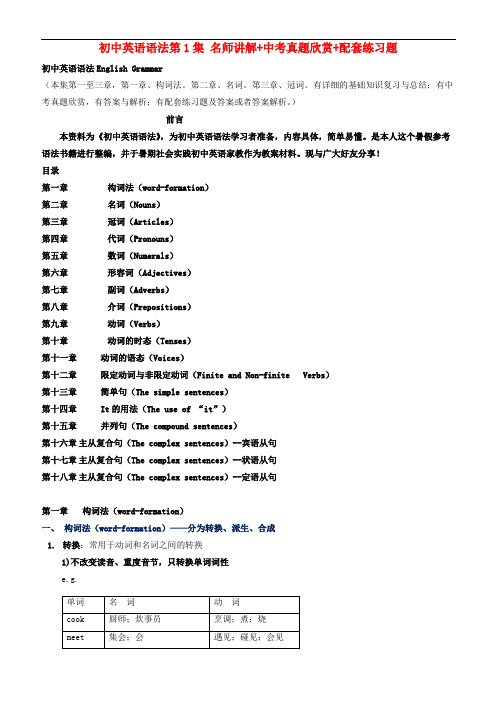
初中英语语法第1集名师讲解+中考真题欣赏+配套练习题初中英语语法English Grammar(本集第一至三章,第一章、构词法。
第二章、名词。
第三章、冠词。
有详细的基础知识复习与总结;有中考真题欣赏,有答案与解析;有配套练习题及答案或者答案解析。
)前言本资料为《初中英语语法》,为初中英语语法学习者准备,内容具体,简单易懂。
是本人这个暑假参考语法书籍进行整编,并于暑期社会实践初中英语家教作为教案材料。
现与广大好友分享!目录第一章构词法(word-formation)第二章名词(Nouns)第三章冠词(Articles)第四章代词(Pronouns)第五章数词(Numerals)第六章形容词(Adjectives)第七章副词(Adverbs)第八章介词(Prepositions)第九章动词(Verbs)第十章动词的时态(Tenses)第十一章动词的语态(Voices)第十二章限定动词与非限定动词(Finite and Non-finite Verbs)第十三章简单句(The simple sentences)第十四章 It的用法(The use of “it”)第十五章并列句(The compound sentences)第十六章主从复合句(The complex sentences)--宾语从句第十七章主从复合句(The complex sentences)--状语从句第十八章主从复合句(The complex sentences)--定语从句第一章构词法(word-formation)一、构词法(word-formation)——分为转换、派生、合成1.转换:常用于动词和名词之间的转换1)不改变读音、重度音节,只转换单词词性e.g.2)有些双音节词,作名词时,第一个音节重度;作动词时,第二个音节重度e.g.名词动词’increase /’inkri:s/ 增加 in’crease /in’kri:s/增加3)有些词可以用读音变化改变词性e.g. excuse /iks’kju:s/(名)歉意;道歉;借口 excuse /iks’kju:z/(动)原谅4)有些形容词可以转化为动词e.g.He slowed down at the crossroad./ Please warm up the cold meat.2.派生1)前缀:加前缀一般不改变词类,而只是改变原词的词义①构成反义词的前缀dis- disagree disappear dislikeim- impolite impossibleun- unable uncertain unhappy②一些表示特定意思的前缀down往下 downloadkilo千 kilometreman人,由人 man-mademis错误地 mistake misunderstandre重新,再次 rebuild retell③可以改变词性的前缀a-加在名词前构成形容词或副词 asleep aboard asideen-加在名词或形容词前构成动词 encourage enable enrich2)后缀:加后缀一般改变词性①名词后缀-an African American-er dancer driver reporter-ing feeling reading-ion action decision-ment development government-ness happiness sadness-or actor visitor-tion invention pronunciation-ure failure pleasure②形容词后缀-an American African-en golden wooden-ese Chinese Japanese-ful beautiful hopeful useful-ive active expensive-less careless endless useless-ly friendly-ous nervous dangerous-y dirty rainy③副词后缀-ly carefully happily clearly④数词后缀-teen thirteen -ty twenty -th fifth3.合成1)合成名词①词加名词 basketball②形容词加名词 blackboard③动词-ing形式+另一词 dining-room2)合成形容词①形容词+动词-ing形式 hard-working②形容词+过去分词 kind-hearted③名词+过去分词 man-made④名词+动词-ing形式 man-eating peace-loving3)合成动词①词+动词 water-ski②副词+动词 overeat overcome③ 形容词/副词+动词 white-wash4)合成副词、代词①合成副词 upstairs beforehand②合成代词 myself everything4.其他构词法1)缩短法 telephone—phone2)前后各截部分 refrigerator—fridge3)缩写法****************************************************************结束第二章名词(Nouns)一、名词的数:名词复数的构成规则1)规则复数变化多数在词尾加-s①以s,x,ch,sh结尾的名词加-es e.g. match—matches②以辅音字母加y结尾的名词,改y为i,再加-es e.g. story—stories③以f,fe结尾的名词,一般把f,fe改为v,再加-es e.g. leaf—leaves但也有只加-s e.g. roof—roofs④以o结尾的名词,多数加-es e.g. hero—heroes但也有只加-s e.g. piano—pianos注:以 o 结尾的名词,我们可按下面一条规律来记住它们的复数形式:指人和农作物的加 -es、其他的加-s.(或者是有生命的加 -es,无生命的加 -s)2)不规则变化①名词单复数同形 e.g. sheep, deer, fish②单词拼写中变化元音字母 e.g. man—men tooth—teeth③有些是用-en做词尾构成复数形式 e.g. child—children ox—oxen④表示某国人的单词,单复数形式分为三种:A.单复数相同 a Chinese—five ChineseB.词尾加-s an American—seven AmericansC.变-man为-men an Englishman—ten Englishmen3)复合名词的复数形式1.将复合名词中的主题名词变为复数形式 e.g. new-comer—new-comers2.没有主题名词的,则在词尾加-s e.g. grown-up—grown-ups3.以man或woman开头的复合词,名词都要变为复数形式e.g. man-doctor—men-doctors4.其他合成的词,只把最后一个词变为复数 eg.boy friend—boy friends5.由两部分组成的物体名词和其他一些名词常用复数形式e.g. trousers,clothes,scissors6.专有名词一般为不可数名词,但是表示某姓一家或夫妇和同名同姓若干时,用复数e.g. The Browns have gone to the cinema.7.在做定语的合成词中,名词要用单数形式e.g. an eighty-three-year-old grandpa8.以-s结尾的专有名词有两种情况A.表示国家、报纸等名词看做单数 e.g. the United StatesB. 表示群岛、山脉、瀑布、奥运会等专有名词看做复数,谓语也用复数形式e.g. The Alps are in Europe.名词复数词尾加-s或-es的读音规则如下表二、名词的种类:普通名词——个体名词,集体名词(可数)物质名词,抽象名词(不可数)专有名词1)普通名词是某一类人、某一类事物、某种物质或抽象概念的名词①个体名词:表示单个的人或物e.g. tree树 doctor医生 cup杯子 apple苹果②表示一群人或一些事物的总称e.g. crowd人群 army军队 class班级 family家庭 group小组,团队police警方 team队 public公众③物质名词:表示无法分为个体的物质e.g. tea茶 paper纸 snow雪 cloth布 wood木头sugar糖 meat肉 sand沙 ink墨水 coffee咖啡④抽象名词:表示动作、状态、品质、感情等方面的抽象概念e.g. happiness幸福 work工作 music音乐 experience经历pride骄傲 failure失败 protection保护2)专有名词3)可数名词和不可数名词①可数名词:其所表示的事物可以用数来计算,前面可用不定冠词a,an和数词,有复数形式②不可数名词:其所表示的事物不可以用数来计算,前面不能用不定冠词a,an和数词,没有复数形式。
初中英语语法第5集 名师讲解+中考真题欣赏+配套练习题
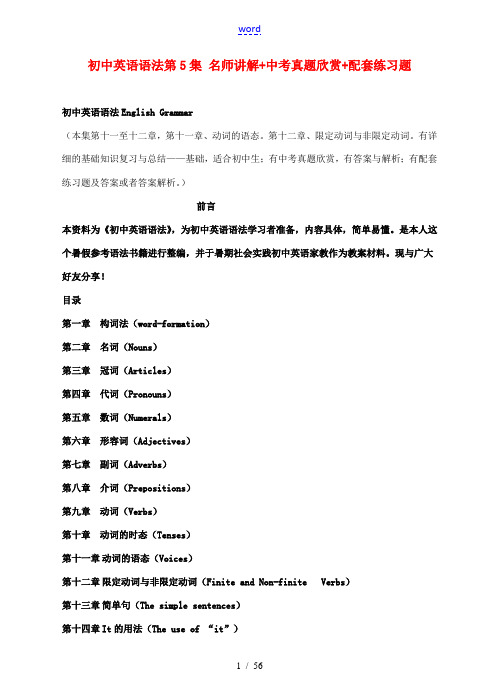
初中英语语法第5集名师讲解+中考真题欣赏+配套练习题初中英语语法English Grammar(本集第十一至十二章,第十一章、动词的语态。
第十二章、限定动词与非限定动词。
有详细的基础知识复习与总结——基础,适合初中生;有中考真题欣赏,有答案与解析;有配套练习题及答案或者答案解析。
)前言本资料为《初中英语语法》,为初中英语语法学习者准备,内容具体,简单易懂。
是本人这个暑假参考语法书籍进行整编,并于暑期社会实践初中英语家教作为教案材料。
现与广大好友分享!目录第一章构词法(word-formation)第二章名词(Nouns)第三章冠词(Articles)第四章代词(Pronouns)第五章数词(Numerals)第六章形容词(Adjectives)第七章副词(Adverbs)第八章介词(Prepositions)第九章动词(Verbs)第十章动词的时态(Tenses)第十一章动词的语态(Voices)第十二章限定动词与非限定动词(Finite and Non-finite Verbs)第十三章简单句(The simple sentences)第十四章It的用法(The use of “it”)第十五章并列句(The pound sentences)第十六章主从复合句(The plex sentences)--宾语从句第十七章主从复合句(The plex sentences)--状语从句第十八章主从复合句(The plex sentences)--定语从句******************************************************第十一章动词的语态(Voices)语态有两种:主动语态和被动语态1.被动语态的构成1)被动语态的基本构成形式主语+助动词be+过去分词2)被动语态的时态被动语态的时态通过助动词be的变化来体现。
这个助动词必须与主语的人称和数相一致。
现以do为例,将被动语态常用时态列表如下:3)各种时态的被动语态①一般现在时的被动语态e.g. The lights are usually turned on at 6:30.②一般过去时的被动语态e.g. Our house was built in 1979.③一般将来时的被动语态e.g. This question will be answered by our headmaster.④过去将来时的被动语态e.g. I knew the room would be cleaned.⑤现在进行时的被动语态e.g. Your bicycle is being repaired now.⑥过去进行时的被动语态e.g. The man was being questioned by the police.⑦现在完成时的被动语态e.g. My car has been repaired.⑧过去完成时的被动语态e.g. I heard she had already been sent to hospital.4)带情态动词的被动语态情态动词+be+过去分词e.g. This must be done as soon as possible.5)有些短语动词的被动语态有些短语动词,如“动词+介词”、“动词+副词”、“动词+名词+介词”,其作用相当于及物动词,也可以由被动语态。
初中英语语法第6集(结束集):名师讲解中考真题欣赏配套练习题及答案(共97页)
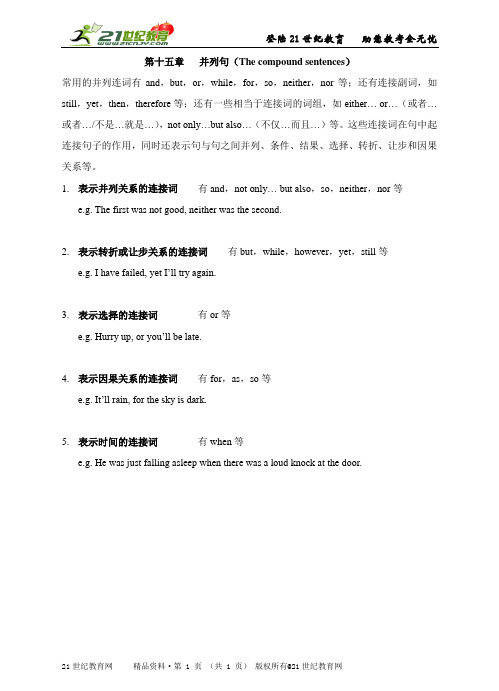
登陆21世纪教育助您教考全无忧第十五章并列句(The compound sentences)
常用的并列连词有and,but,or,while,for,so,neither,nor等;还有连接副词,如still,yet,then,therefore等;还有一些相当于连接词的词组,如either… or…(或者…或者…/不是…就是…),not only…but also…(不仅…而且…)等。
这些连接词在句中起连接句子的作用,同时还表示句与句之间并列、条件、结果、选择、转折、让步和因果关系等。
1.表示并列关系的连接词有and,n ot only… but also,so,neither,nor等
e.g. The first was not good, neither was the second.
2.表示转折或让步关系的连接词有but,while,however,yet,still等
e.g. I have failed, yet I’ll try again.
3.表示选择的连接词有or等
e.g. Hurry up, or you’ll be late.
4.表示因果关系的连接词有for,as,so等
e.g. It’ll rain, for the sky is dark.
5.表示时间的连接词有when等
e.g. He was just falling asleep when there was a loud knock at the door.
21世纪教育网精品资料·第 1 页(共 1 页)版权所有@21世纪教育网。
初中英语语法第6集(结束集):名师讲解中考真题欣赏配套练习题及答案(共97页)
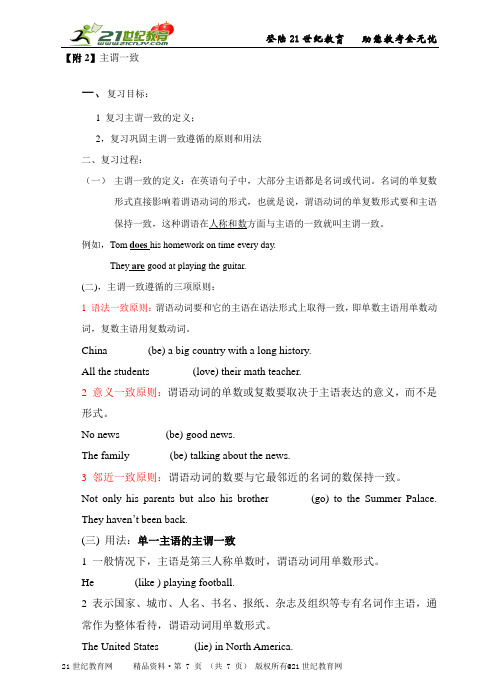
【附2】主谓一致一、复习目标:1 复习主谓一致的定义;2,复习巩固主谓一致遵循的原则和用法二、复习过程:(一)主谓一致的定义:在英语句子中,大部分主语都是名词或代词。
名词的单复数形式直接影响着谓语动词的形式,也就是说,谓语动词的单复数形式要和主语保持一致,这种谓语在人称和数方面与主语的一致就叫主谓一致。
例如,Tom does his homework on time every day.They are good at playing the guitar.(二),主谓一致遵循的三项原则:1 语法一致原则:谓语动词要和它的主语在语法形式上取得一致,即单数主语用单数动词,复数主语用复数动词。
China _______(be) a big country with a long history.All the students________(love) their math teacher.2 意义一致原则:谓语动词的单数或复数要取决于主语表达的意义,而不是形式。
No news ________(be) good news.The family _______(be) talking about the news.3 邻近一致原则:谓语动词的数要与它最邻近的名词的数保持一致。
Not only his parents but also his brother _______(go) to the Summer Palace.They haven’t been back.(三) 用法:单一主语的主谓一致1 一般情况下,主语是第三人称单数时,谓语动词用单数形式。
He _______(like ) playing football.2 表示国家、城市、人名、书名、报纸、杂志及组织等专有名词作主语,通常作为整体看待,谓语动词用单数形式。
The United States ______(lie) in North America.The New York Times ________(read) all over the United States.3 以-s结尾的名词本身不表示复数意义时,谓语动词通常用单数形式,如news,maths,physics,plastics等。
初中英语语法第6集(结束集):名师讲解中考真题欣赏配套练习题及答案(共97页)

第十六章主从复合句(The complex sentences)--宾语从句主从复合句(初中掌握三类从句,即宾语从句、状语从句、定语从句)一、宾语从句宾语从句在主从复合句中起宾语的作用,既可作谓语动词的宾语,也可作介词、非谓语动词(动词不定式、动名词、分词)的宾语。
(一)、引导宾语从句的关联词的用法①陈述意义的宾语从句,由从属连词that引导,that本身无义,在口语或非正式文体中常可省略。
e.g. She said (that) she would come.②一般疑问意义的宾语从句由从属连词whether或if引导,如果强调“究竟是…还是不…”,可在whether后加note.g. Can you tell me if/whether you can come here tomorrow?I’ll wait to see whether your words are true or not.③特殊疑问意义的宾语从句,由连接代词who,whom,whose,what,which和连接副词when,where,why,how引导,宾语从句中的语序为陈述式语序。
e.g. Please tell me when you were born.(二)、宾语从句的语序宾语从句的语序应为陈述句的语序。
例如:I hear (that) physics isn’t easy.I think (that) you will like this school soon.Can you tell me how I can get to zoo?Please tell me when we’ll have the meeting.(三). 宾语从句的时态1. 如果主句的时态是一般现在时,宾语从句该用什么时态就用什么时态。
如:I don’t think (that) you are right.Please tell us where he is.Can you tell me how I can get to the railway station?2. 如果主句的时态是一般过去时,宾语从句只能用相应的过去时态(一般过去时,过去进行时,过去将来时,过去完成时)。
初中英语语法第6集(结束集):名师讲解中考真题欣赏配套练习题及答案(共97页)
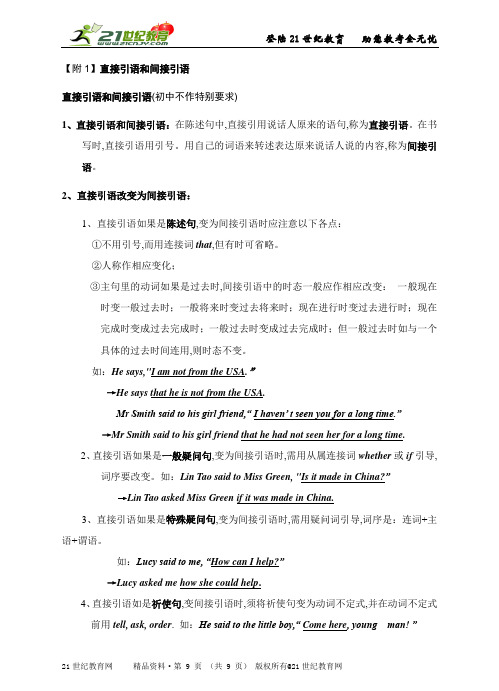
【附1】直接引语和间接引语直接引语和间接引语(初中不作特别要求)1、直接引语和间接引语:在陈述句中,直接引用说话人原来的语句,称为直接引语。
在书写时,直接引语用引号。
用自己的词语来转述表达原来说话人说的内容,称为间接引语。
2、直接引语改变为间接引语:1、直接引语如果是陈述句,变为间接引语时应注意以下各点:①不用引号,而用连接词that,但有时可省略。
②人称作相应变化;③主句里的动词如果是过去时,间接引语中的时态一般应作相应改变:一般现在时变一般过去时;一般将来时变过去将来时;现在进行时变过去进行时;现在完成时变成过去完成时;一般过去时变成过去完成时;但一般过去时如与一个具体的过去时间连用,则时态不变。
如:He says,"I am not from the USA.”→He says that he is not from the USA.Mr Smith said to his girl friend,“ I haven’ t seen you for a long time.”→Mr Smith said to his girl friend that he had not seen her for a long time.2、直接引语如果是一般疑问句,变为间接引语时,需用从属连接词whether或if引导,词序要改变。
如:Lin Tao said to Miss Green, "Is it made in China?”→Lin Tao asked Miss Green if it was made in China.3、直接引语如果是特殊疑问句,变为间接引语时,需用疑问词引导,词序是:连词+主语+谓语。
如:Lucy said to me, “How can I help?”→Lucy asked me how she could help.4、直接引语如是祈使句,变间接引语时,须将祈使句变为动词不定式,并在动词不定式前用tell, ask, order. 如:He said to the little boy,“ Come here, young man! ”thisthesenowagotodaythis week(month,etc.) next week ( month,etc.) yesterdaytomorrowhere thatthosethenbeforethat daythat week ( month,etc.) the next week ( month,etc.) the day beforethe next (following) day there→He asked the little boy to go there.5、直接引语变为间接引语时,指示代词以及表示时间和地点的词或词组应作相应变化:在直接引语中在间接引语中***倒装句:谓语的一部分或者全部放在主语之前的句子称为倒装句。
- 1、下载文档前请自行甄别文档内容的完整性,平台不提供额外的编辑、内容补充、找答案等附加服务。
- 2、"仅部分预览"的文档,不可在线预览部分如存在完整性等问题,可反馈申请退款(可完整预览的文档不适用该条件!)。
- 3、如文档侵犯您的权益,请联系客服反馈,我们会尽快为您处理(人工客服工作时间:9:00-18:30)。
初中英语语法第5集:名师讲解+中考真题欣赏+配套练习题及答案(共48页)初中英语语法English Grammar(本集第十一至十二章,第十一章、动词的语态。
第十二章、限定动词与非限定动词。
有详细的基础知识复习与总结——基础,适合初中生;有中考真题欣赏,有答案与解析;有配套练习题及答案或者答案解析。
)前言本资料为《初中英语语法》,为初中英语语法学习者准备,内容具体,简单易懂。
是本人这个暑假参考语法书籍进行整编,并于暑期社会实践初中英语家教作为教案材料。
现与广大好友分享!目录第一章构词法(word-formation)第二章名词(Nouns)第三章冠词(Articles)第四章代词(Pronouns)第五章数词(Numerals)第六章形容词(Adjectives)第七章副词(Adverbs)第八章介词(Prepositions)第九章动词(Verbs)第十章动词的时态(Tenses)第十一章动词的语态(Voices)第十二章限定动词与非限定动词(Finite and Non-finite Verbs)第十三章简单句(The simple sentences)第十四章It的用法(The use of “it”)第十五章并列句(The compound sentences)第十六章主从复合句(The complex sentences)--宾语从句第十七章主从复合句(The complex sentences)--状语从句第十八章主从复合句(The complex sentences)--定语从句******************************************************第十一章动词的语态(Voices)语态有两种:主动语态和被动语态1.被动语态的构成1)被动语态的基本构成形式主语+助动词be+过去分词2)被动语态的时态被动语态的时态通过助动词be的变化来体现。
这个助动词必须与主语的人称和数相一致。
现以do为例,将被动语态常用时态列表如下:3)各种时态的被动语态①一般现在时的被动语态e.g. The lights are usually turned on at 6:30.②一般过去时的被动语态e.g. Our house was built in 1979.③一般将来时的被动语态e.g. This question will be answered by our headmaster.④过去将来时的被动语态e.g. I knew the room would be cleaned.⑤现在进行时的被动语态e.g. Your bicycle is being repaired now.⑥过去进行时的被动语态e.g. The man was being questioned by the police.⑦现在完成时的被动语态e.g. My car has been repaired.⑧过去完成时的被动语态e.g. I heard she had already been sent to hospital.4)带情态动词的被动语态情态动词+be+过去分词e.g. This must be done as soon as possible.5)有些短语动词的被动语态有些短语动词,如“动词+介词”、“动词+副词”、“动词+名词+介词”,其作用相当于及物动词,也可以由被动语态。
在被动语态结构中,介词或副词不可丢掉,且其位置不变。
e.g. My brother’s child is taken care of by my mother.6)含有两个宾语的被动语态在多数情况下,把间接宾语变为主语,而把直接宾语保留下来。
e.g. She was told a long story.7)含有复合宾语的被动语态把宾语变为主语,宾语补足语变为主语补足语e.g. The child was named Tom.2.主动语态变被动语态1)两种语态结构对比(箭头表示动作方向)主动语态→ → e.g. He wrote the letter.被动语态e.g. The letter was written by him.2)主动句变被动句的基本步骤①把主动句的宾语作为被动句的主语②把主动句的谓语改为“be+该动词的过去分词”形式,做被动句的谓语,注意be要根据主语的人称、数和该句的时态要求保持一致③主动句的主语改为by的宾语,有时可省略“by+主语”3)主动句变被动句的基本句式主动句:主语+助动词(情态动词)+谓语+宾语① e.g. We will do that experiment next time.被动句:主语(原宾语)+助动词(情态动词)+be+过去分词+by+原主语e.g. That experiment will be done by us next time.主动句:主语+短语动词+宾语② e.g. The nurse takes good care of us.被动句:主语(原宾语)+be+短语动词的过去分词形式+by+原主语e.g. We are taken good care of by the nurse.主动句:主语+谓语+间接宾语+直接宾语③ e.g. We gave him some magazines.被动句:主语(间接宾语)+be+过去分词+直接宾语\主语(直接宾语)+be+过去分词+to(for)+间接宾语e.g. He was given some magazines (by us).\ Some magazines were given to him (byus).【注】一般将主动句中表示人的间接宾语变为被动句的主语主动句:主语+谓语+宾语+宾语补足语④ e.g. They chose Tom captain.被动句:主语(原宾语)+谓语+原宾语补足语e.g. Tom was chosen captain.【注】如主动句中宾语补足语是不带to的不定式,变成被动语态后要加toe.g. I saw him go to the church.He was seen to go to the church.3.被动语态的用法英语中,何时情况下才使用被动语态的举例1)不知道动作的执行者,只知道承受者的情况e.g. Silk is produced in Suzhou.2)不必说出动作的执行者的情况e.g. Such books are written for children.3)需要突出和强调动作的承受者的情况e.g. She is liked by everyone.【注】①不及物动词没有被动语态,如:happen,take,please,disappear等e.g. 这件事发生在1989年。
(Wrong)This was happened in 1989.(Right)This happened in 1989.②有些动词,如:have,feel,hold,become,rise,look,sound,seem等只能着眼于表示状态而不强调动作,一般不用于被动语态中。
e.g. 树变绿了。
(Wrong)The trees have been become green.(Right)The trees have become green.4.被动语态和“连系动词+表语(过去分词)”的区别被动语态中的过去分词是动词,表动作;系表结构中的过去分词相当于形容词,表状态。
前者可用by短语表示动作的执行者,后者则一般不用by短语。
比较:This book was written last year. The glass was broken by my sister.这本书是去年写的。
(被动语态)玻璃杯是我妹妹打破的。
(被动语态)This book was well written. The glass is broken.这本书写得很好。
(系表结构)玻璃杯破了。
(系表结构)************************************************************************结束【中考真题欣赏】【2010辽宁·沈阳】5.—Have you ____ joined in a dragon boat race?—Yes,I have.A.never B.still C.seldom D.ever答案D【解析】现在完成时,ever 曾经。
句意:你曾经参加过龙周赛吗?故答案选D【2010辽宁·沈阳】7.Tomorrow there's a programme about our school on TV,then it ____ by millions of people.A.will see B.saw C.will be seen D.was seen答案:C【解析】根据句意,此句应用被动语态,又本句是将来时,故答案选C。
【2010辽宁·沈阳】11.—Where ____ you ____ lunch?—At home.There was no school lunchA.did;have B.are;having C.will;have D.do;have答案:A【解析】根据答语,此句应该用一般过去时,故答案选A。
【2010湖北·襄樊】37.--I the Great Wall next week.--Have a good trip!A.visit B.visited C.am visiting D.have visited答案C【解析】next week 是将来时的时间状语,现在进行时表将来,故答案选C。
【2010湖北·襄樊】38.--I went to see you yesterday evening.But you weren’t in.Where were you then?--I _ _ a walk by the lake with my husband.A.was having B.am having C.have had D.have答案A【解析】当两个一长一短的动作,在过去某时某地同时发生时,用过去进行时表示较长的动作,根据句意,故答案应选A【2010湖北·襄樊】39.--What a dean and bright classroom,isn’t it?--Yes,it’s always clean and bright because it every day.A.cleans B.cleanedC.is cleaned D.was cleaned答案C【解析】根据句意,教室干净整洁是因为它每天被打扫,故用被动语态,又因every day是一般现在时的标志,故答案选C。
